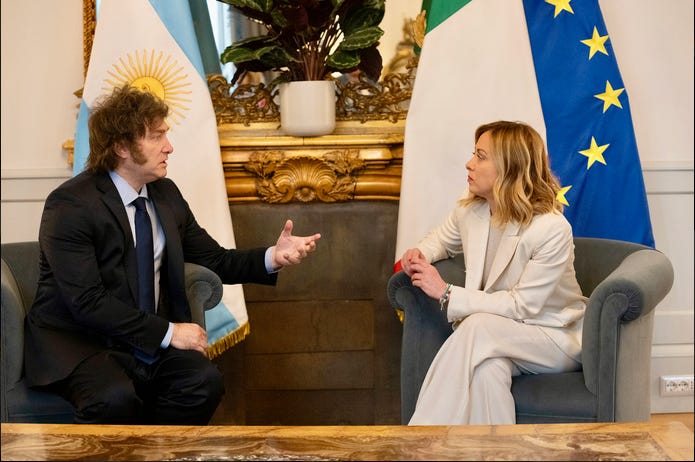Let Argentina, Israel, Italy, Taiwan and Others Lead, Daniel Pipes Says
A weaker U.S. may compel allies to increase strength

[“America has a positive role to play in advancing freedom and democracy in the rest of the world,” is one of the themes here at The Editors. I’ve been reporting that out by soliciting, from a variety of thoughtful voices, answers to this prompt:
What are the most promising, concrete, specific steps America can take over the next few years to promote freedom, democracy, and rule of law in other countries? What places and people would you focus on, what’s the case for making the efforts, and how, practically, do you get it done given the constraints imposed by the American political and fiscal landscape?
Today’s response comes from Daniel Pipes. Pipes is president of the Middle East Forum and author of the just-published Israel Victory: How Zionists Win Acceptance and Palestinians Get Liberated (Wicked Son). — Ira Stoll]
The posed question has a dated quality to it: It made sense between 1945 and 2008, from the United States becoming a great power to the election of Barack Obama. Now, sadly, it is an anachronism.
America represented a new kind of great power, one uniquely melding national interest with moral principle. Forged in the hot war with Nazism and the Cold War with Communism, girded by a faltering but adequate bi-partisan consensus, uncontested in its leadership, Washington indeed stood proud for two-thirds of a century as the tribune of “freedom, democracy, and rule of law.”
It then fell from this position, and increasingly so with time. Between a Democratic party that features loud elements who despise the United States (“F**k America”) and a Republican party that responds with petulant isolationism (“Stop Funding Ukraine War”), the center has weakened over the past fifteen years. None of the candidates for president (not even the minor ones) offers the potential leadership for the United States to fulfill its former mission of leadership and morality.
Therefore, I cannot offer “promising, concrete, specific steps.” Instead, I can point to a mostly-unnoticed silver lining: the bolstering of American allies.
During the old days of a boisterous United States, I noted in 1997, an “American officialdom … convinced of the righteousness and importance of its cause” repeatedly made the mistake of shouldering too much responsibility for international security, thereby
shoving aside the local parties. This had the perverse effect of freeing up the locals; aware that what they do has almost no importance, they reverted to political immaturity. No longer having to worry about their own skins, they instead indulge in corruption (Vietnam), political opportunism (NATO), and conspiracy theories (the Middle East). The American adult rendered others child-like.
This led to the “topsy-turvy situation whereby the distant and strong power begs nearby and weak states to contain their mutual enemy.”
Some examples: Danish politician Mogens Glistrup notoriously called for replacing Denmark’s military “with a Russian-language recording that says ‘We surrender’.” Massive crowds of Europeans protested the stationing of U.S. cruise and Pershing II missiles in their countries (“700,000 West Germans massed … in an act of dissent they hoped would mark a turning point in their nation’s history”). The neighbors of Saddam Hussein’s Iraq avoided taking steps to restrain him, leaving this onerous duty to Washington — and then criticized the Americans for doing so. Seoul expressed anger at Washington for insisting on a hard line toward Pyongyang during the heyday of South Korea’s “Sunshine Policy” toward the North.
A weaker United States, in contrast, compels those allies to mature. In Europe, that means leaving the pleasant world of welfare states, waking to the realities of hard power, standing up to Russia, helping Ukraine financially, and developing a serious military capability. In the Middle East, it translates into forming a semi-official alliance against Iran headed by Saudi Arabia and including even Israel. In East Asia, it brings a great number of states from South Korea to Japan to Taiwan to the Philippines to Singapore to Vietnam to India into multiple alliances to defend against China.
Not relying on Uncle Sam focuses attention, strengthens long-atrophied muscles, and develops a seriousness of purpose. In these ways, a child-like America pushes its allies to increase their responsibility, will, and capabilities. Perhaps, just perhaps, a leadership diffused among Argentina, Israel, Italy, Taiwan, and others will strengthen the free world. May the Oval Office tutorial begin.
Other, earlier answers: “Don’t Lose Any Countries” Is Elliott Abrams’s Advice, by Elliott Abrams
Counter Communist China in the U.S. and at the U.N., Ellen Bork Recommends, by Ellen Bork
Help Ukraine and Israel Prevail, Says Carl Gershman, by Carl Gershman
Resist Redefining “Democracy” as Elite Preferences, Kontorovich Says, by Eugene Kontorovich
Spend More on Defense and Less on Everything Else, Mandelbaum Warns, by Michael Mandelbaum
More Building, Less Lecturing, Mansour Recommends, by Hussein Aboubakr Mansour
Tell the World the Truth About Iran, Says Richard Perle, by Richard Perle




Pipes' article fits well with President Trump's challenge to NATO members to increase their defense budgets to 2% of GDP or "else". The Trump policy is not the US withdrawing from the world, it is the US demanding that others not be free riders on US defense expenditures, or in Pipes' framing, not be "immature".
But I'm sure Pipes would have felt more optimistic if Trump had chosen for VP Senator Cotton instead of Senator Vance.
I wish that what Daniel Pipes writes is true. But I reminded of what Henry Kissinger said about the calls for consultation with our European allies: You call Europe. The phone rings 20 times, and a Dane answers.